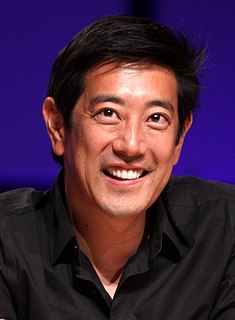A Quote by Joe Kaeser
We have to prove that digital manufacturing is inclusive. Then, the true narrative will emerge: Welcome, robots. You'll help us. But humans are still our future.
Related Quotes
Back in the twentieth century, we thought that robots would have taken over by this time, and, in a way, they have. But robots as a race have proved disappointing. Instead of getting to boss around underlings made of steel and plastic with circuitry and blinking lights and tank treads, like Rosie the maid on The Jetsons, we humans have outfitted ourselves with robotic external organs. Our iPods dictate what we listen to next, gadgets in our cars tell us which way to go, and smartphones finish our sentences for us. We have become our own robots.
The danger of the past was that men became slaves. The danger of the future is that men may become robots. True enough, robots do not rebel. But given man's nature, robots cannot live and remain sane, they become ''Golems',' they will destroy their world and themselves because they cannot stand any longer the boredom of a meaningless life.
The inherent non-linearity of the digital allows for more input from others, including the subject and reader as collaborators. The top-down, bedtime-style story is of limited use. A non-linear narrative that allows for increased complexity and depth, and encourages both subject and reader to have greater involvement, will eventually emerge more fully from the digital environment. This, in a sense, is the more profound democratization of media.
I think sometime we will go to Mars and I think we'll explore it with humans sometime, but I think it's really wise to do all the robotic exploration ahead of time and learn as much as possible. Once we have learned as much as possible with the robots, then that's the time to send people, and let them then continue the research that the robots have started.
One of the marvelous things about community is that it enables us to welcome and help people in a way we couldn't as individuals. When we pool our strength and share the work and responsibility, we can welcome many people, even those in deep distress, and perhaps help them find self-confidence and inner healing.
Out of this darkness a new world can arise, not to be constructed by our minds so much as to emerge from our dreams. Even though we cannot see clearly how it's going to turn out, we are still called to let the future into our imagination. We will never be able to build what we have not first cherished in our hearts.
I've always enjoyed stories that take place in the future but my one disappointment was that the future books described never came. We're not on other planets, there are no flying cars, and the only robots we have in our homes just sweep the floor. So I wanted to write about a future that I thought could really happen. People ask me when I tell them the title of the book, 'Are we all dead?' The good news is, no. We're still here. And I even think the future in my book is strangely hopeful, although I'm sure there will be people who strongly disagree.



































